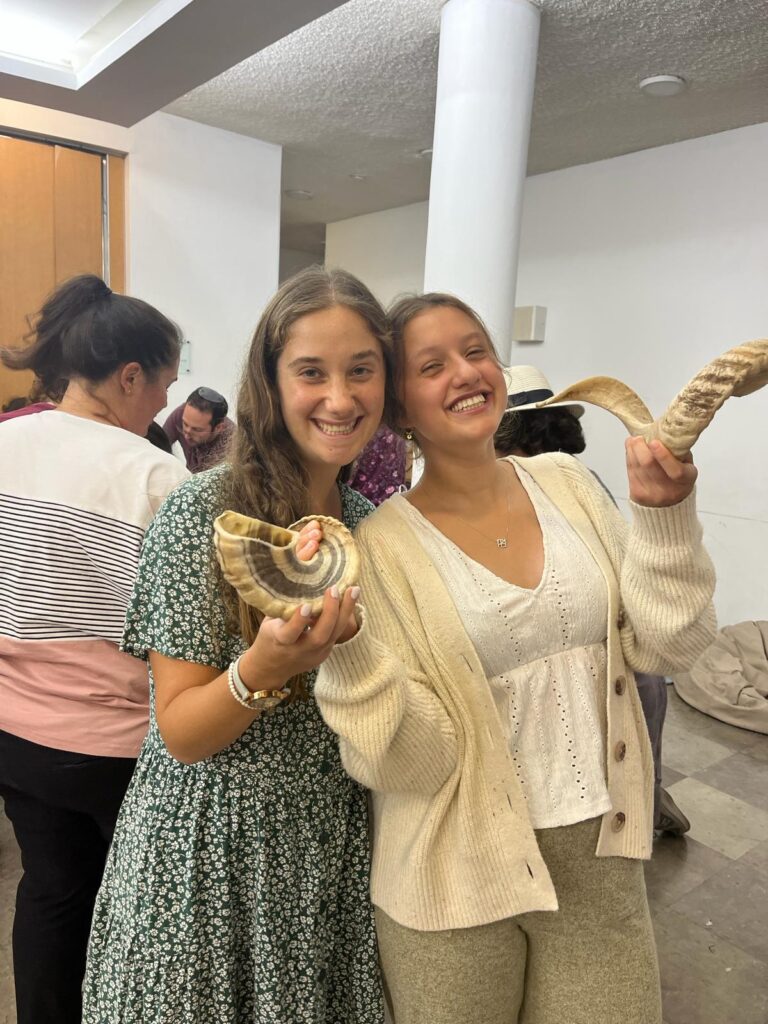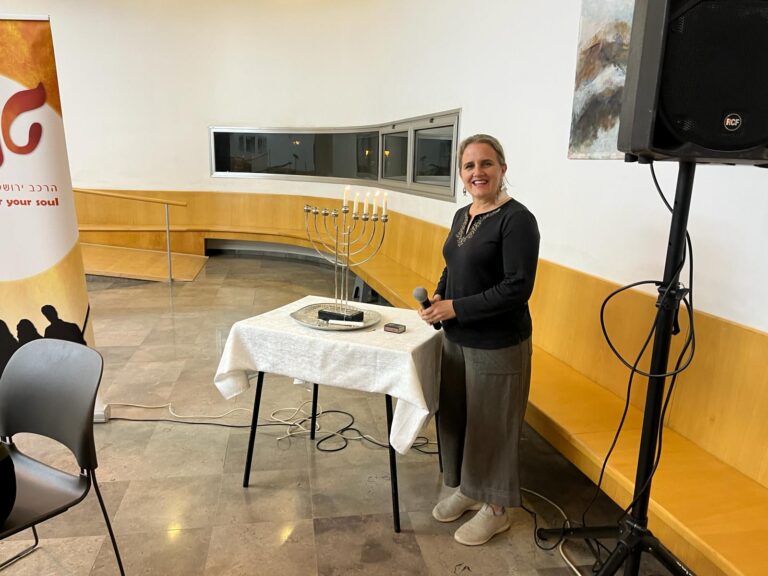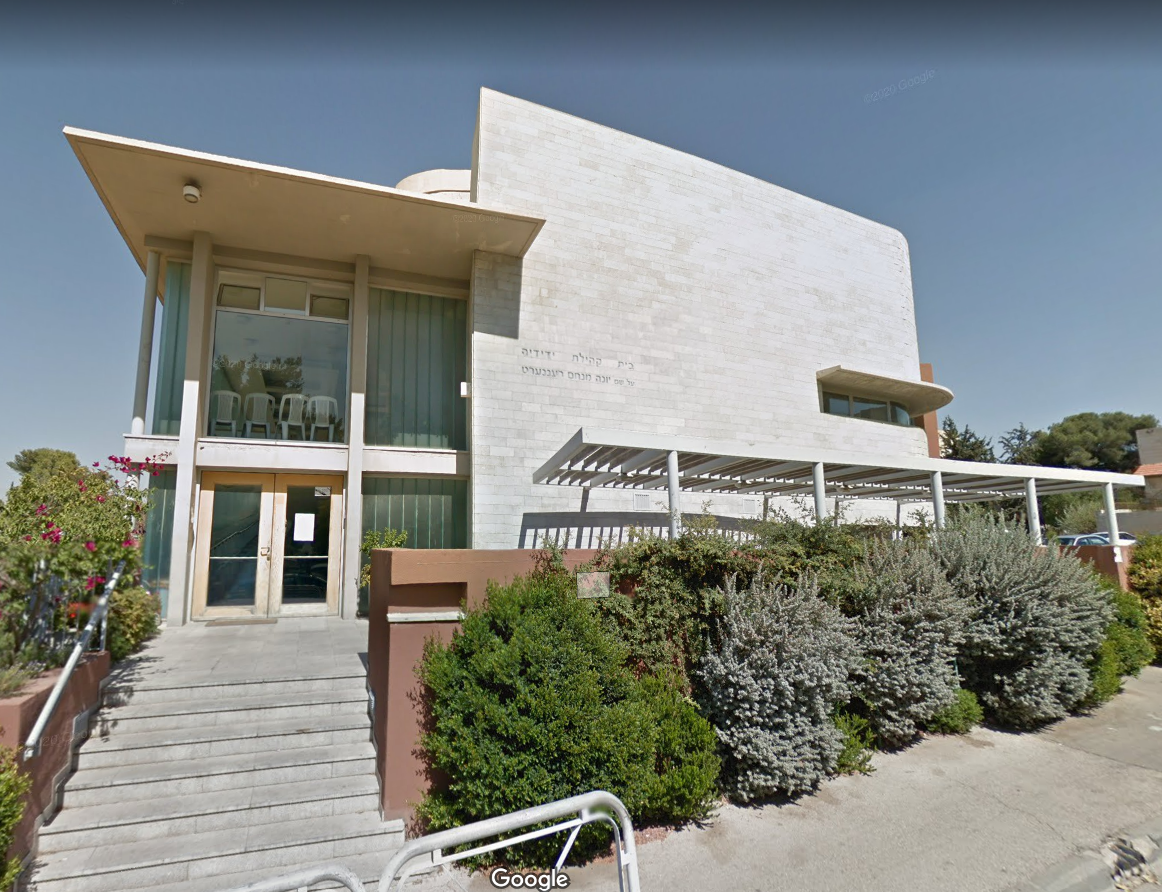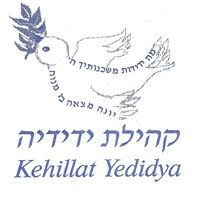Yedidya is a pluralistic community, with singles, young married couples, and established families. Congregants come from diverse religious backgrounds and are encouraged to participate in many different ways (for example, as Torah readers, prayer leaders, announcers, program heads, committee volunteers).Yedidya offers daily, Shabbat, and holiday services led by its own members.
The mechitzah at Yedidya divides the Beit Knesset down the middle, with symmetrical and equal sections for men and women. During services, women’s voices sing harmoniously along with the men’s. The congregation functions entirely in Hebrew.
Since many of the congregants are immigrants who arrive with no family, Yedidya attempts to create a community and fulfill the function of being a surrogate family for those who so desire . The Kehilla offers not only prayer services and classes, but also social functions open to the entire community. Kehillat Yedidya maintains a Kupat Tzedaka (charity fund) to collect and distribute funds to those in need in local neighborhoods. A committee for Gemilut Chesed assists individuals in times of joy and sorrow. Immigrants and visitors from abroad (both Jewish and non-Jewish) are provided home hospitality through an organized outreach program, and Yedidya often serves as a home congregation to academics and others on sabbatical year visits, and young people studying in Israel for the year.
We are also committed to building alliances among Jews of different communities, and between Jews and non-Jews. We regularly host visiting groups of Christian Clergy and lay people for Shabbat services and Shabbat meals.

Jewish Law in Context at Yedidya
Yedidya is deeply committed to encouraging the extensive participation of women within the community – both in communal prayer and in community leadership. A standing committee on law and custom addresses halakhic questions which are brought to its attention. Given this framework, decisions are made by the entire community and/or the governing board of directors upon the recommendation of the Halakha Committee. Although we do not have a rabbi who acts as an authority figure, several rabbis are members of the congregation, and we appreciate their learned input.
Women read from the Torah during separate women’s Torah readings and Bat Mitzvahs, read the Megillot during holiday services, and offer sermons and Torah discussions on Shabbat and holidays.
Our Simchat Torah celebration was the first of its kind in Israel and has been the model for other Modern Orthodox congregations by encouraging the full participation of women in the community. We focus on promoting Jewish learning for all members of the community. Lectures, classes and informal educational programs for all ages, within our community and the wider public, are offered.

Our Building
“An unfurling scroll” is one of the descriptions that members of Kehillat Yedidya used to describe the look of our building, construction of which began at the start of September 2000 and finished in August 2003.
The new building, which architect Mendy Rosenfeld has managed perfectly to integrate with its park side environment, has approximately 700 sq. m. of floor space on two floors. The upper floor serves as the main sanctuary, and the lower floor includes space for women’s Torah readings, children’s activities, and a large multi-purpose area and an office. A basement level has been started and we hope it will be finished in the not-too-distant future.
According to the architect, one of the special features of the building is the quality of the light. Rosenfeld envisioned a sanctuary that is brightly but indirectly lit by natural light through the use of windows placed in such a way as to take full advantage of the direction of the sun’s rays in the early evening and the morning. The intention, he said, was to create a space that is at once open and welcoming, but also “set apart” for prayer and devotion.
The sanctuary, of course, has special features in keeping with Kehillat Yedidya’s practices and beliefs. The table from which prayers are led and the Torah read, like the Ark, is the center of the synagogue, equidistant from both the men’s and the women’s sections.
One prominent feature of the new building is the long ramp that leads from the building’s entrance up to the sanctuary on the second floor. The ramp provides equal, convenient access to the sanctuary for all worshippers, including the handicapped. It also serves as a transition area in which people arriving for prayers move from the outside into the holy area of the sanctuary itself.
Learn more about:
The parochet in the sanctuary made by Chana Cromer
The ner tamid in the sanctuary made by Mira Maylor
The ner tamid in the daily minyan area made by Nathanael Putnam
The story behind our ner tamid

Statement of Principles
1) “In all your ways acknowledge Him�” (Proverbs 3:6)
Kehillat Yedidya supports the concept of full Jewish life according to the Halacha. The commandments develop relationships with God, interpersonal relationships, and responsibilities towards the surrounding society.
2) “That which is old should be renewed; that which is new should be hallowed.” (Rav Kook)
A life of Torah and commandments must never become ossified. We aspire to integrate tradition and changing social reality, within the framework of Halacha. The community itself has an important role to play in questions of determining what our customs will be. The life of the community is based on praying together regularly. But the element of keva, of fixed prayer, should be infused with kavana, intention and meaning. Public prayer should become a spiritual and esthetic experience, with maximum participation. An important component of the services is the divrei Torah and shiurim, which add an intellectual dimension to the experience.
3) “Its ways are ways of pleasantness, and all its paths are peace.” (Proverbs 3:17)
The Torah inculcates within us the pursuit of peace�domestic peace, societal peace, peace among nations. The use of “ways” instead of “way” or “paths” instead of “path” teaches us that within the framework of Torah, Halacha and the community, there may be many different points of view. Even when there is controversy, there should be mutual respect.
4) “In the image of God created He him, male and female created He them.” (Gen. 1:27)
All human beings were created in the image of God and are, therefore, equal. This equal involves men and women, Jews and non-Jews, people with special needs, etc. The synagogue should be open and accessible to all, although equality is not synonymous with sameness. We respect the differences among people and believe that every human being is entitled to the dignity of a creature created in the Divine Image. Kehillat Yedidya is recognized as a pioneer in the full involvement of women in community activity.
5) “Justice justice shall you pursue�” (Deut. 16:20)
A life of Torah should be based on honesty, moral rectitude and a passion for justice, both on the personal and social levels. We are especially called upon to seek justice for those in our society who are weak and unprotected. As a community, we aspire to express these values in our lives.
6) “Do not separate yourself from the community.” (Avot 2:5)
Yedidya is not only a synagogue. It is a true community, in which the members share the happy occasions of all, as well as the problems and pain. Members of Yedidya are invested in developing a strong community, characterized by a shared communal culture and mutual aid. Still, we must not forget that we are part of the neighborhood of Bak’a. At the top of our concerns should be the welfare of our neighborhood and our city. We should be involved in the social and cultural life of the neighborhood. In another sense, we are part of the wider religious Zionist community in Israel, Israeli society in general, world Jewry, and the “family” of humankind. Each of these levels brings with it differing degrees of involvement and responsibility.
7) “Hospitality is greater than receiving the Divine Presence.” (Shabbat 127a)
We are commanded to offer hospitality to new members of the community, students, new immigrants, and non-Jewish guests, who are interested in experiencing a Shabbat or Chag with a Jewish community. We try to ensure that our guests will feel comfortable at the service and at the Kiddush. Since many of our members are immigrants�new or veteran�the community largely functions for them as a kind of “extended family.” This is expressed through an extensive program of social activities, including communal meals on various occasions.
8) “Excellent is study of the Torah together with worldliness�” (Avot 2:2)
We strive to emphasize the importance of the sciences and the arts, together with our study of Torah. In our Torah study, it is not only permitted but encouraged to integrate many and varied sources, comparative insights and commentators of disparate backgrounds. Works of art have a place of honor on the walls of the synagogue.
9) “To be a free people in our land�” (HaTikvah)
We see in the State of Israel the expression of Jewish national sovereignty in this world, and celebrate its independence day with honor and festivity. Similarly, we pray for the welfare of the State and of its soldiers. Our lives as citizens of the State obligate us to protect its peace and security through Army or National Service, for both men and women, and to preserve its character as a Jewish and democratic state.
10) “You shall teach them diligently unto your children�” (Deut. 6:7)
The next generation is the guarantor of continuity. The community is deeply invested in a program of varied age-appropriate activities for the children. We want the children to feel that they are part of the community. The highlight of this activity is the celebration of a Bar or Bat Mitzvah, that leads naturally into the junior congregation, and through that, we hope, to becoming an adult member of the community, or, at least, to maintaining a strong, ongoing connection with the community and its values.
Our Team
Office Manager – Einat Nisim
Chairperson – Elise Kranc
Gabbaim – Jakob Melchior | Donny Reicher
Gabbait – Elise Kranc
Tzedaka – Dorit Meijers
Resource Development – Marc Render
Shabbat Meals Hospitality – Bobbie Silberklang
Group Coordinator Simchas – Debbie Weissman
Bereavement Aid – Eliezer Finer (050) 9942501 | Yechiel Greniman
Death Announcements – Sheldon Salzberg (052) 3077694
Members’ Assistance – Annabelle Landgarten | Deborah Lustig
Kehilla Weekly Newsletter – Editor
Kehilla Discussion Group – Moderator
Building Maintenance – Marc Render
Hall Rental – Adi Amitai (055) 6661142
